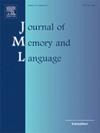孤立的和语境化的理解暴露对口语单词的产生具有持续的影响:来自双语重复引物的证据
IF 3
1区 心理学
Q1 LINGUISTICS
引用次数: 0
摘要
通过在 4 个实验中测量重复引物对双语图片命名的反应时间和准确性的影响,研究了单词的理解接触对其日后生成的影响。实验中使用了两种编码任务来练习用日后产生的语言理解单词:简单的阅读或听力以及翻译成另一种语言。这些编码任务分别在几分钟和 24-48 小时的保留间隔内加快了图片命名的速度,当要阅读或翻译的单词嵌入句子时,效果尤为明显。这些结果表明,对单词的孤立理解和语境理解都会导致持续的学习,这在以后的生产中表现得非常明显。与默读或听力相比,翻译任务能引起更强的重复引物,而默读或听力并不能持续地获得概念,也不能为以后的生成提供更有效的练习。研究结果支持这样一种理论,即重复引物是建立在促进共同成分过程的基础上的,反映了持续学习。本文章由计算机程序翻译,如有差异,请以英文原文为准。
Isolated and contextualized comprehension exposures have sustained effects on spoken word production: Evidence from bilingual repetition priming
The impact of comprehension exposures to words on their later production was investigated by measuring repetition priming in bilingual picture-naming RTs and accuracy in 4 experiments. Two types of encoding tasks were used to practice word comprehension in the language of later production: simple reading or listening and translating to another language. These encoding tasks speeded picture naming at retention intervals of several minutes and 24–48 h, with particularly strong effects when words to be read or translated were embedded in sentences. These results indicate that both isolated and contextualized comprehension exposures to words result in sustained learning that is evident in later production. The translation task elicited stronger repetition priming than silent reading or listening, which do not consistently result in conceptual access and provide less effective practice for later production. The findings support a theory in which repetition priming is based on the facilitation of shared component processes and reflects sustained learning.
求助全文
通过发布文献求助,成功后即可免费获取论文全文。
去求助
来源期刊
CiteScore
8.70
自引率
14.00%
发文量
49
审稿时长
12.7 weeks
期刊介绍:
Articles in the Journal of Memory and Language contribute to the formulation of scientific issues and theories in the areas of memory, language comprehension and production, and cognitive processes. Special emphasis is given to research articles that provide new theoretical insights based on a carefully laid empirical foundation. The journal generally favors articles that provide multiple experiments. In addition, significant theoretical papers without new experimental findings may be published.
The Journal of Memory and Language is a valuable tool for cognitive scientists, including psychologists, linguists, and others interested in memory and learning, language, reading, and speech.
Research Areas include:
• Topics that illuminate aspects of memory or language processing
• Linguistics
• Neuropsychology.

 求助内容:
求助内容: 应助结果提醒方式:
应助结果提醒方式:


